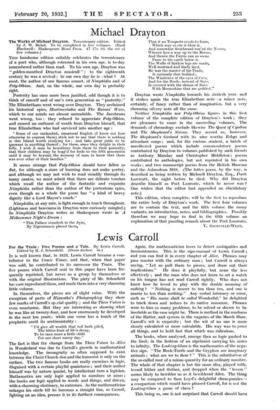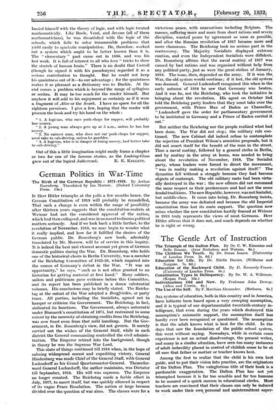Lewis Carroll
For the Train : Five Poems and a-Tale. By Lewis Carroll. Edited by H. J. Sehonfield. (Denis Archer. 5s.) IT is well known that, in 1853, Lewis Carroll became a con- tributor to the Comic Times, and that, when that paper was sold, he contributed to its successor the Train. The five poems which Carroll sent to this paper have been fre- quently reprinted, but never as a group by themselves or with the original illustrations. The piety of Mr. Schonfield har.i-iow reproduced them, and made them into a very charming little volume.
In themselves, the pieces are of slight value. With the exception of parts of Hiatcalha's Photographing they show few marks of Carroll's sp..cial quality ; and the Three Voices is even wearisome. But they are interesting as showing what he was like at twenty-four, and how enormously he developed in the next ten years ; while one verse has a touch of the prophetic amid its sentimentality :
" I'd give all wealth that toil hath piled, The bitter fruit of life's decay, To be once more a little child For one short sunny day."
The fact is that the change from the Three Voices to Alice in Wonderland was due to Carroll's growth in mathematical knowledge. The incongruity so often supposed to exist between the Christ Church don and the humorist is only on the surface. The two famous books are really exercises in logic, disguised with a certain playful quaintness ; and their author himself was by nature quaint, by intellectual turn a logician. Mathematics are only logic applied to numbers or areas ; the books are logic applied to words and things, and driven, with a charming obstinacy, to extremes. As the mathematician enlarges his circle till its becomes a straight line, so Carroll, lighting on an idea, presses it to its furthest consequences. Again, the mathematician loves to detect ambiguities and inconsistencies. This is the sign-manual of Lewis Carroll ; and you can find it in every chapter of Alice. Phrases may pass muster with the ordinary man ; but Carroll is always saying, Let us pull them to pieces, and draw out their
implications." He does it playfully, but none the less effectively ; and the man who does not learn to set a watch on his tongue has not read Carroll rightly. Who does not know how he loved to play with the double meaning of nothing? " Nothing is nearer to ten than ten, and one is nearer to ten than nothing." Any verbal intricacy or error, such as " His name shall be called Wonderful," he delighted to track down and reduce to its native nonsense. Phrases were to him so many problems, to be solved or shown to be insoluble as the case might be. There is method in the madness of the Hatter, and system in the vagaries of the March Hare. Carroll's wit is exquisite ; but the wit of no one is more closely calculated or more calculable. His way was to prove all things, and to hold fast that which was ridiculous.
The books, when analysed, emerge then as logic pushed to the limit, in the fashion of an algebraist carrying his series to infinity. The Looking-Glass is the mathematics of the nega- tive sign. "The Mock-Turtle and the Gryphon are imaginary animals ; what are we to them ? " This is the substitution of the so-called root of a minus quantity for an ordinary number. The whole of that chapter is but the same idea, played with, tossed hither and thither, and dropped when the " lesson " seems likely to bewilder us as it bewildered Mice. The thing may be compared to Sam Loyd's delightful chess-puzzles- a comparison which would have pleased Carroll, for is not the Looking-Glass a game of chess ?
This being so, one is not surprised that Carroll should have busied himself with the theory of logic, and with logic treated mathematically. Like Boole, Vend, and Jevons (all of them mathematicians), he Was dissatisfied • with the logic of the schools;- which fails- to sblve innumerable problems that yield easily to symbolic manipulation. He, therefore, worked out a system which ought to be better known than it is. The " elementary " part came out in 1896, and was his last work. It is full of interest to all who love " tricks to show the stretch of human brain." There is no doubt that Carroll (though he signed it with his pseudonym) regarded it as a serious contribution to thought. But he could not keep his quaintness out of it—to our advantage ; for the quaintness makes it as pleasant as a dictionary was to Buckle. At the end comes a problem which is beyond the range of syllogism or sorites. It may be too much for the reader himself. But anyhow it will add to his enjoyment as certainly as if it were a fragment of Alice or the Smirk. I have no space for all the eighteen premises I give a few, hoping that the reader will procure the book and try his hand on the whole : "1. A -logician, who eats pork-chops for supper, will probably lose money. " 2. A young man always gets up at 5 a.m., unless he has lost money. " 3. Na earnest man, who does not eat 'pork-chops for supper,
need take to cab-driving, unless he gambles. - " 4. A logician, who is in danger of losing money, had better take to cab-driving." •
Out of this a little imagination might easily frame a chapter or two for one of_ the famous . stories, as the Looking-Glass grew out of the logical Jabbentork. E. E. KuttErr.







































 Previous page
Previous page